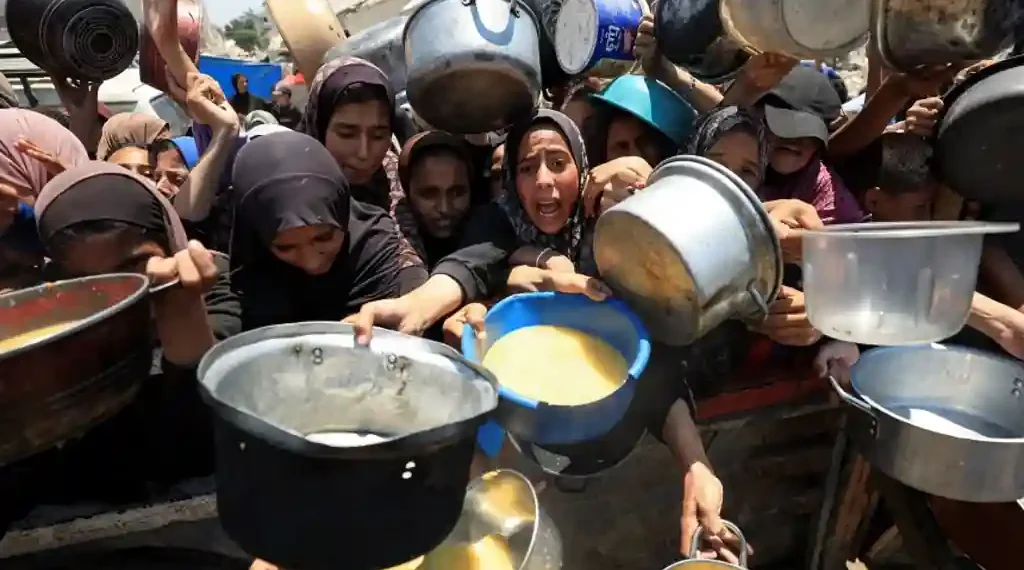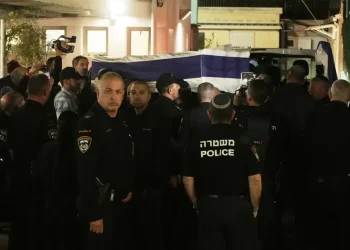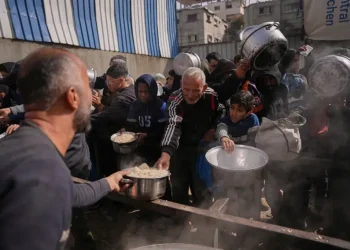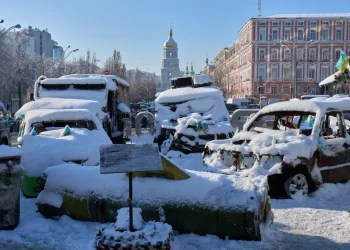Israel pauses Gaza military operations to allow humanitarian aid as malnutrition crisis deepens
July 28, 2025, 13:00 (U.S. Eastern Time)
Israel has introduced limited daily halts in military operations across parts of Gaza to allow humanitarian aid to reach civilians, responding to mounting international concern over extreme hunger and worsening malnutrition. While the move has been welcomed by global aid agencies, experts question whether the current efforts are enough to prevent a full-scale famine.
The humanitarian crisis: how Gaza reached the brink of starvation
Gaza has been in a state of deep humanitarian crisis since the conflict escalated following the Hamas attacks on Israel on October 7. Over the past two years, repeated displacements, infrastructure destruction, and restricted access to essential supplies have left the territory’s 2.1 million residents in dire conditions.
Before the conflict, Gaza typically received around 3,000 aid and commercial trucks weekly. That number dropped drastically following the onset of hostilities. During a brief ceasefire early this year, a few hundred trucks were allowed in each day—an amount aid groups said was insufficient. Then, in March, Israel imposed a complete blockade to pressure Hamas into releasing remaining hostages, further choking off access to food, fuel, and medicine.
The result has been a worsening hunger emergency. According to the United Nations, nearly all of Gaza’s population now faces acute food insecurity. In May, the UN warned that more than 500,000 Gazans were on the brink of famine, and over 70,000 children were in urgent need of treatment for severe malnutrition.
Deaths from malnutrition rising sharply
By mid-July, the World Health Organization (WHO) reported a surge in deaths caused by malnutrition in Gaza, with 63 fatalities recorded that month alone. Palestinian health officials say 133 people—almost 90 of them children—have died from starvation-related causes since the start of the conflict, most of them since March.
The crisis has escalated as local bakeries and community kitchens shuttered, and food prices soared beyond reach for most residents. Although thousands of aid trucks remain stationed at the border, unable to enter, many people in Gaza are forced to scavenge for scraps or risk their lives approaching food convoys. According to the UN, more than 1,000 civilians have been killed during such desperate attempts—primarily by Israeli forces.
Images of severely malnourished children have circulated widely, sparking outrage in Europe and beyond. The governments of the UK, France, and Germany issued a joint statement last week, describing the situation in Gaza as “man-made and avoidable.”
Israel announces limited “tactical pauses” for aid delivery
In response to the intensifying criticism, the Israel Defense Forces (IDF) on Sunday began implementing daily “tactical pauses” in three parts of Gaza: Al-Mawasi, Deir al-Balah, and an area near Gaza City. These zones had previously been designated as “safe areas,” but fighting and bombardments continued there in recent months.
The tactical pause will occur daily from 10:00 a.m. to 8:00 p.m. local time “until further notice,” according to the IDF. Israel also committed to opening “secure humanitarian corridors” between 6:00 a.m. and 11:00 p.m., allowing aid convoys to pass safely.
The IDF framed the initiative as a counter to accusations of deliberate starvation, stating that the move “refutes the false claim of deliberate starvation in the Gaza Strip.”
Aid delivery remains a logistical and political challenge
While aid trucks from Egypt and Jordan have begun moving toward Gaza, the two entry points—Kerem Shalom in the south and Zikim in the north—remain bottlenecks. Hundreds of trucks are queued at the border, and only around 100 entered Gaza on Sunday, far short of the level needed to meet urgent demands.
UN agencies have welcomed the pause but emphasized that sustained and safe access—not isolated time windows—is crucial for effective aid delivery. Joe English, a spokesperson for UNICEF, warned that limited access “cannot work miracles,” especially for malnourished children who require ongoing care and medical support.
The World Food Programme (WFP) stated that it has enough food stockpiled or en route to feed Gaza’s population for nearly three months, provided Israeli authorities expedite entry permissions. The WFP called for “sustained action and access” to avert mass starvation.
Meanwhile, Israel has resumed coordination with international partners for aid airdrops. On Saturday night, Israel, Jordan, and the United Arab Emirates dropped 28 aid packages into Gaza. But airdrops are viewed by aid groups as an inefficient and risky method. “This isn’t a vast, remote desert,” said English. “This is an urban war zone, and airdrops simply don’t work well here.”
Political backlash within Israel and criticism from Hamas
Israel’s decision to facilitate aid deliveries has sparked political divisions. Far-right National Security Minister Itamar Ben Gvir said he was not consulted on the pause and called for a complete cessation of all aid, urging full military conquest of Gaza and “voluntary migration” of its residents.
Hamas, for its part, condemned the Israeli plan as “deceptive,” accusing the Israeli government of managing the starvation crisis for political optics. A statement by the group said, “The occupation’s plan for airdrops and control of so-called humanitarian corridors represents a blatant policy to manage starvation, not end it.”
The Hostages Families Forum, which represents relatives of Israeli captives held by Hamas, also weighed in. The group criticized Israel’s piecemeal approach to both aid and hostage negotiations, urging the government to secure a comprehensive deal that would include the return of hostages and an end to the war.
Can the new aid strategy succeed?
Though the new daily pauses are a positive step, aid organizations remain cautious. Security threats to convoys, the risk of looting, and inconsistent clearance processes all hamper effective distribution.
The WHO said more than 5,000 children under five were treated for malnutrition in just the first two weeks of July, reflecting the scale of the crisis. Reversing malnutrition at this stage requires both urgent action and long-term medical and nutritional support.
Experts agree that unless Israel dramatically increases and sustains access for humanitarian operations, the situation will continue to deteriorate.
Conclusion: More than a pause is needed
The humanitarian crisis in Gaza is at a critical juncture. Israel’s decision to pause military activity in select areas may help ease the suffering temporarily—but without consistent, large-scale aid access and coordination with humanitarian agencies, the starvation crisis will likely persist.
As Tom Fletcher, head of the UN Office for the Coordination of Humanitarian Affairs, put it: “This isn’t about a few extra trucks. This is about a system that’s been broken for too long.”
This article was rewritten by JournosNews.com based on verified reporting from trusted sources. The content has been independently reviewed, fact-checked, and edited for accuracy, neutrality, tone, and global readability in accordance with Google News and AdSense standards.
All opinions, quotes, or statements from contributors, experts, or sourced organizations do not necessarily reflect the views of JournosNews.com. JournosNews.com maintains full editorial independence from any external funders, sponsors, or organizations.
Stay informed with JournosNews.com — your trusted source for verified global reporting and in-depth analysis. Follow us on Google News, BlueSky, and X for real-time updates.













